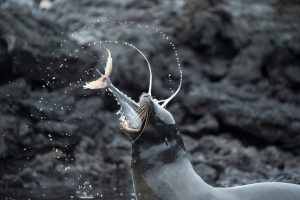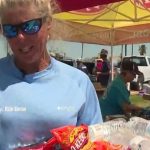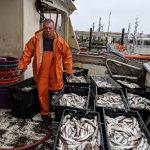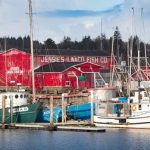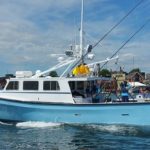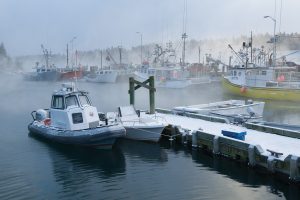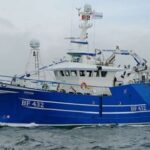Daily Archives: April 18, 2013
Scallop bill shucks regional development
JUNEAU — The Alaska Regional Development Organization celebrated the “silver jubilee” of its 25th anniversary in its annual report this year, and the Alaska Legislature marked the occasion by letting the program die after the bill to ex tend its sunset date for five years fell victim to an obscure fish war involving Korean hair crab and weathervane scallops. continued
tend its sunset date for five years fell victim to an obscure fish war involving Korean hair crab and weathervane scallops. continued
Study shows depleted fish stocks can come back from the brink What a difference in articles!
(Phys.org) It turns out, in fact, that the resilience – the ability to recover from overfishing – of a fish stock is enhanced, not hurt, even if it has been moderately overexploited for decades, offering the possibility of swift recovery if sensible catch limits are placed on it. Philipp Neubauer, a postdoctoral scholar, and Olaf Jensen, an assistant professor of marine and coastal sciences, say the key is in the adaptation of fish to over-fishing. A fish stock is over-fished if its numbers fall below half the level needed to sustain maximum harvest. continued
“Canada’s cod, and many other depleted fish, unlikely to recover” By Margaret Munro, Postmedia News
“Study offers bleak outlook for fish recovery” Aly Thomson, The Canadian Press
Newfoundland Crab Issues. The Fisheries Broadcast with John Furlong
 The crab dispute moves to the Union Headquarters – Harvesters say outside buyers might be the key to higher prices. Derrick Dalley accuses the FFAW of lying – The manager of the crab plant in Hickman’s Harbour takes us through the events of that protest there Monday. Those story’s and more here
The crab dispute moves to the Union Headquarters – Harvesters say outside buyers might be the key to higher prices. Derrick Dalley accuses the FFAW of lying – The manager of the crab plant in Hickman’s Harbour takes us through the events of that protest there Monday. Those story’s and more here
Some imported farmed seafood is a toxic cocktail – sometimes laced with antibiotics and pesticides that are not allowed in Canadian food production.
Vancouver Free Press. – Have a look at the frozen shrimp in your local grocery store and you’ll see that most of it is imported from developing countries in Southeast Asia and, increasingly, Latin America. Millions of small producers in the world’s poorest countries produce 99 percent of the world’s farmed shrimp, according to the Fisheries and Aquaculture Department, a division of the Food and Agriculture Organization (FAO) of the United Nations, with exports to the rest of the world amounting to almost $9 billion a year. “Intensive shrimp farming is an environmental disaster,” says UBC Fisheries Centre director Daniel Pauly. “In addition, aquaculture from Southeast Asia—from Thailand and Vietnam and other countries—is exposed to all kinds of chemicals for the simple reason that shrimp are farmed in systems that are heavily contaminated. continued (I NEVER agree with this guy, but I do on this.)
Two variations so far – “Canada’s cod, and many other depleted fish, unlikely to recover” and “Study offers bleak outlook for fish recovery”
By Margaret Munro, Postmedia News – Canada’s once bountiful cod stocks are not likely to bounce back, according to an international study on the dangers of overfishing. “Here we are more than 20 years after the cod was effectively depleted, and according to our analysis, the recovery of the cod stocks is highly improbable,” says fisheries scientist Jeffrey Hutchings at Dalhousie University, co-author of the study published in the journal Science on Thursday….at the end of the article: “Ecosystems change,” says Hutchings, noting how seals, herring and mackerel now fill some of the gaps left by Canada’s cod collapse. (which part does he not understand?) contined
Aly Thomson, The Canadian Press HALIFAX – The recovery of overexploited fish populations such as cod has been slower than expected and many depleted stocks may never be able to bounce back, a new study says. continued
It would be great if our Canadian friends would leave comments about this. BH
1 comment
Gloucester fishing community seeks relief from catch limits – Gloucester’s historic industry. Uncertain future
 A few weeks ago, second-generation commercial fisherman B.G. Brown almost gave up. He had learned how much fish he can legally catch in the coming year. The numbers were shockingly low. “I was ready to throw in the towel,” Brown told a crowd of about 40 local business people, political leaders, concerned community members, and fellow fishermen that gathered last week to discuss the uncertain future of Gloucester’s historic industry. continued
A few weeks ago, second-generation commercial fisherman B.G. Brown almost gave up. He had learned how much fish he can legally catch in the coming year. The numbers were shockingly low. “I was ready to throw in the towel,” Brown told a crowd of about 40 local business people, political leaders, concerned community members, and fellow fishermen that gathered last week to discuss the uncertain future of Gloucester’s historic industry. continued
Gulf Coast Governors Call on Congress to Give Management Control to States for Red Snapper Fishery
fosterfollynews.com – The letter to U.S. House and Senate leadership, signed by the governors’ states, “With a stock that is recovering steadily, our recreational anglers are being allowed to fish less and less, and there is no hint of willingness from NOAA Fisheries to deviate from this present, unsatisfactory course. As governors of Gulf states, we believe this confusing management is just the latest evidence of a federal management system that is irretrievably broken. We seek to establish a better fishery management approach for Gulf red snapper.” continued
NPFMC fails to clarify observer program
Homer News – The Alaska Longline Fishermen’s Association’s attempt to get the North Pacific Fishery Management Council to clarify the objectives of the restructured observer program and provide a meaningful timeline for implementing the electronic monitoring program were largely unsuccessful at last week’s meeting. continued
Asian carp could threaten La. fishery
 A Louisiana chef is teaming up with wildlife officials to target a big fish that could cause even bigger problems in the state’s productive fishing grounds. These fish eat voraciously and reproduce rapidly. One fish reproduces three to four times a year, releasing between 100,000 to 3 million eggs each spawning, Parola said. They have no major predators and can eat more than 20 percent of their body weight in algae and plankton a day. Asian carp can weigh up to 100 pounds. With their large size and hunger for plankton, they could pose a threat to native species. continued
A Louisiana chef is teaming up with wildlife officials to target a big fish that could cause even bigger problems in the state’s productive fishing grounds. These fish eat voraciously and reproduce rapidly. One fish reproduces three to four times a year, releasing between 100,000 to 3 million eggs each spawning, Parola said. They have no major predators and can eat more than 20 percent of their body weight in algae and plankton a day. Asian carp can weigh up to 100 pounds. With their large size and hunger for plankton, they could pose a threat to native species. continued
REMINDER! TODAY! Watermen’s symposium set at Chesapeake College.1 p.m. Thursday, April 18, free and open to the public.
The symposium will start with opening remarks from Franchot, Dean, Chesapeake College Vice President for Academic Affairs Dr. Kathryn Barbour and Martin L. Gary of the Tidal Fisheries Advisory Commission. Link
Canada and Norway moves in seal case against EU
Norway and Canada have requested the WTO to appoint the members of the dispute settlement panel established to consider EU’s ban on seal products. “For the Norwegian authorities, this issue involves important principles, such as our right to sustainably harvest our living marine resources and to sell products derived from hunting and fishing,” said Minister of Fisheries and Coastal Affairs Lisbeth Berg-Hansen. continued
Crab plant gets court order against fishermen
 The company that runs a Random Island fish plant at the focus of a mass dumping of crab this week has obtained a court order against members of the fisheries union. About 200 fishermen protested at Golden Shell Fisheries in Hickman’s Harbour on Monday. continued
The company that runs a Random Island fish plant at the focus of a mass dumping of crab this week has obtained a court order against members of the fisheries union. About 200 fishermen protested at Golden Shell Fisheries in Hickman’s Harbour on Monday. continued
26 members of Congress urge House Appropriations Committee to reject funding Atlantic and Gulf of Mexico catch shares until rewrite of the MSA
![]() A total of 26 members of Congress, including Rep. John Tierney, have urged the House Appropriations Committee to reject funding for new catch share fishery management programs in the Atlantic and Gulf of Mexico until the House Natural Resources Committee completes its rewrite of the Magnuson-Stevens Act….The Northeast groundfish catch share program, whose coverage includes Gloucester and New England, was created without an industry referendum and has mixed with new rigid requirements for the rebuilding of overfished stocks to leave the fishery in a statutory disaster. continued
A total of 26 members of Congress, including Rep. John Tierney, have urged the House Appropriations Committee to reject funding for new catch share fishery management programs in the Atlantic and Gulf of Mexico until the House Natural Resources Committee completes its rewrite of the Magnuson-Stevens Act….The Northeast groundfish catch share program, whose coverage includes Gloucester and New England, was created without an industry referendum and has mixed with new rigid requirements for the rebuilding of overfished stocks to leave the fishery in a statutory disaster. continued


































